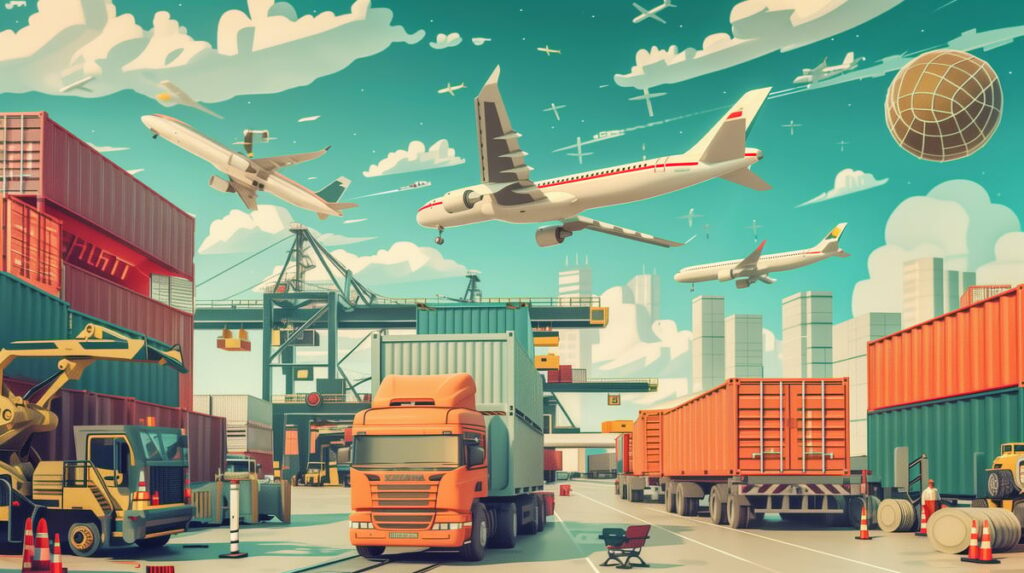7 Supply Chain Trends: What’s in Store for 2024
In the fast-paced world of supply chain management, it’s essential to stay ahead of the curve. Failure to embrace new technologies and methodologies could result in missed opportunities, lost revenue,...
On January 15, 2024
In the fast-paced world of supply chain management, it’s essential to stay ahead of the curve. Failure to embrace new technologies and methodologies could result in missed opportunities, lost revenue, and decreased efficiency. The supply chain industry is constantly evolving, and 2024 promises to be a year of rapid change. In this post, we’re going to delve into some of the most important trends shaping supply chain management today. From AI and machine learning to real-time visibility and control towers, we’ll explore what you need to know to stay ahead.

Trend 1: The Continued Rise of AI and Machine Learning in Supply Chain Optimization
Artificial intelligence (AI) and machine learning are already transforming supply chain management, and this trend is set to continue in 2024. By analyzing vast amounts of data, AI and machine learning algorithms can make complex predictions and optimize processes in real-time. This leads to reduced costs, improved accuracy, and better customer service. AI-driven supply chain management is already in use by leading companies, and we expect to see more widespread adoption in 2024.
Trend 2: Creating Sustainable Value Through Circular Economy Practices
Sustainability has become a critical concern in supply chain management, and Circular Economy Practices are set to take center stage in 2024. Circular Economy replaces the traditional linear model of “take, make, and dispose of” with “reduce, reuse, and recycle.” The goal is to minimize waste, improve resource productivity, and create long-term value for both companies and society. As consumer demand for sustainability continues to grow, companies that embrace Circular Economy practices are more likely to succeed.
Trend 3: Building Resilient Supply Chains for the Next Disruption
From the COVID-19 pandemic to historically low water levels in the Panama Canal, the past few years have highlighted the importance of building resilient supply chains. In 2024, supply chain managers will need to be prepared for the next disruption. This means building flexibility and agility into supply chains, creating redundant sourcing strategies, and investing in real-time visibility. COVID-19 prompted a shift away from just-in-time manufacturing to buffer inventory and more robust supply chains. Companies that can successfully build and maintain resilient supply chains will be well-positioned to succeed in a post-pandemic world.
Never miss a story. Stay updated about Rebus news as it happens.
Trend 4: The Digital Twin Revolution
The Internet of Things (IoT) has already transformed the supply chain, and the Digital Twin Revolution is the latest development. Digital Twins are virtual models of physical assets, which can be used to simulate, test, and optimize supply chain processes. Digital Twins enable managers to gain a deeper understanding of their supply chain, identify inefficiencies, and test “what-if” scenarios. In 2024, we expect Digital Twins to become an essential tool for supply chain optimization.
Trend 5: Transforming Logistics Through Emerging Technologies
The logistics industry is set to be transformed by emerging technologies in the years ahead. These technologies include drones, autonomous vehicles, and Augmented Reality (AR). Drones and autonomous vehicles can be used to improve warehouse efficiency and reduce delivery times. AR can be used to provide real-time information to workers on the shop floor. Companies that can successfully adopt and implement emerging technologies in logistics will be able to maintain a competitive edge.
Trend 6: Mitigating Supply Chain Risk Through Real-Time Visibility and Control Towers
Mitigating supply chain risk will remain a significant concern for supply chain managers in 2024. Real-time visibility and Control Towers can be used to monitor supply chains and respond to issues as they arise. By tracking inventory levels, transportation status, and supplier performance, managers can quickly identify potential disruptions and take corrective action. In 2024, we expect more companies to invest in real-time visibility solutions and Control Towers.

Trend 7: The Role of People in Shaping the Supply Chain Future
The supply chain industry has evolved remarkably over the years, with technological innovations and disruptions altering the way we work. However, among all the changes, the factor that has often been overlooked is the human element in supply chain management. The current supply ch
The logistics industry is set to be transformed by emerging technologies in the years ahead. These technologies include drones, autonomous vehicles, and Augmented Reality (AR). Drones and autonomous vehicles can be used to improve warehouse efficiency and reduce delivery times. AR can be used to provide real-time information to workers on the shop floor. Companies that can successfully adopt and implement emerging technologies in logistics will be able to maintain a competitive edge.
The 7 Supply Chain Trends:
- The Continued Rise of AI and Machine Learning in Supply Chain Optimization
- Creating Sustainable Value Through Circular Economy Practices
- Building Resilient Supply Chains for the Next Disruption
- The Digital Twin Revolution
- Transforming Logistics Through Emerging Technologies
- Mitigating Supply Chain Risk Through Real-Time Visibility and Control Towers
- The Role of People in Shaping the Supply Chain Future
Conclusion
The supply chain industry is a complex and ever-changing landscape. Companies that stay ahead of the curve and embrace new technologies and methodologies will be best positioned to succeed in 2024 and beyond. The seven trends we’ve explored in this post highlight the importance of investing in AI and machine learning, prioritizing sustainability, building resilient supply chains, embracing the Digital Twin Revolution, adopting emerging technologies in logistics, mitigating supply chain risk through real-time visibility and Control Towers, and placing real valuing on and creating resources for our people to succeed. By keeping these trends in mind and taking action to implement them, supply chain leaders can create a more efficient, effective, and sustainable supply chain.








